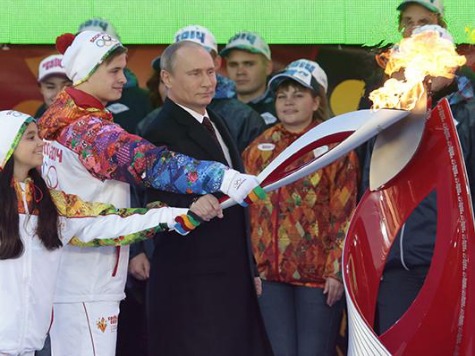How did an unknown summer resort with stray dogs roaming its streets, a civil war raging nearby, and hotels without heat, shower curtains, or clean water land the Winter Olympics?
It’s not as though alternatives didn’t exist. Instead of squalor, the International Olympic Committee could have opted for Salzburg, a quaint Alpine castle town where Mozart was born and the Sound of Music was filmed. It exudes both winter and civilization. Sochi exudes a stench.
It’s not the smell of dead dogs or apple-juice colored tap water that the Black Sea city most pungently emits. It’s the stench of corruption. It explains how Arkady and Boris Rotenberg, two childhood chums of Vladimir Putin, received contracts totaling more than the entire cost of the 2010 Winter Olympics in Vancouver. It explains how two other (now conveniently living abroad) brothers, Magomed and Akhmed Bilalov, turned a $36 million ski slope and hotel project into a $2.3 billion boondoggle. It also explains why a mobbed up, “summer capital” of Russia exhibiting many palm trees but little actual snow won its unlikely bid for the Winter Olympics.
One of the great ironies of the games is that a heroin trafficker banned from attending the 2000 Summer Olympics in Sydney became just seven years later the man most responsible for bringing the 2014 Winter Olympics to Sochi. That road from Sydney to Sochi has been paved with rubles. The Russian government has praised Gafur Rakhimov for his “single minded work” in securing the 2007 votes of Asian IOC members to win the winter games. The American government has sought to freeze his assets. The Uzbekistan government has indicted him. Putin’s government employs him–and Rakhimov them. For every quid there’s a quo.
Rakhimov, despite the unsavory nature of his rogue pharmaceutical business, serves as the vice president of the Olympic Council of Asia. He denies he bribed Sochi’s way from obscurity to Olympic host city. He claims he’s just an influential guy. How influential? He flipped Asians against Asia. Rakhimov proved so persuasive among his colleagues on the Olympic Council of Asia that Sochi defeated Pyeongchang, South Korea–the city that had lost to Vancouver four years earlier and had placed first in the initial round of balloting for 2014–to host the games. If the criminals can’t go the Olympics, then the Olympics will go to the criminals.
The International Olympic Committee addressed Rakhimov obliquely in a statement: “The IOC has a strong, transparent, tried-and-tested bidding process.” Sure. And those Russian figure skaters who fell and stepped out of a double axel at the 2002 games legitimately defeated that flawless Canadian couple in the pairs competition. If you believe the International Olympic Committee awarded its 2014 winter games to Russia based on the merits of the bid, then there’s a bridge–along an $8.7 billion road to the Krasnaya Polyana ski resort–I’d like to sell you in Sochi.
We can believe a nation bribed the International Olympic Committee to host the games. Why do we naively assume that nations don’t bribe Olympic judges and referees to fix the games? The corruption surrounding landing the Olympics, and constructing its overpriced venues, can’t help make us skeptical of the promise of fair competition. Any questionable call by the Belorussian referee or out-of-whack scoring by the Georgian judge will necessarily raise cackles. The corruption in the competition to bring the games to Sochi will taint the competition in Sochi.
Did the best win or, like Sochi itself, did the best connected win? That question looms over these games.
So what did Russia win in the bidding process? The right to spend $50 billion–more than even 2008’s summer spectacle in Beijing–on a bread-and-circuses event that will be gone like a traveling circus in a few weeks. This winter games costing more than the last twenty-one winter games combined will leave behind underutilized stadiums, unfulfilled expectations, and a huge debt in its wake. An estimated 96 percent of the costs of Sochi will be paid by Russian taxpayers, two-thirds of whom, according to one poll, believe that most of the money for the Winter Olympics was stolen or misspent. The games will depart after seventeen days. The mob, the corruption, and those feral dogs will stick around.
The ultimate losers here are the winners of the bidding process. Korea and Austria suffered because of Russia’s corruption. Russians suffer most from Russia’s corruption.

COMMENTS
Please let us know if you're having issues with commenting.